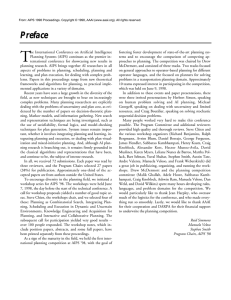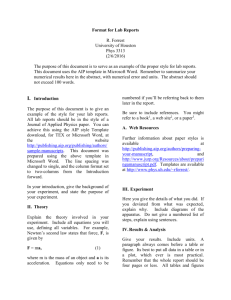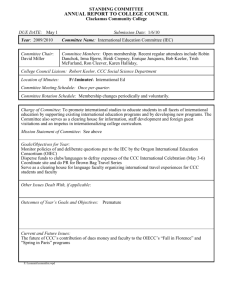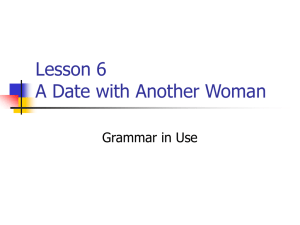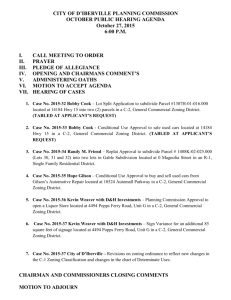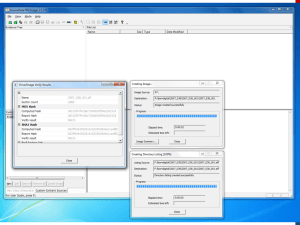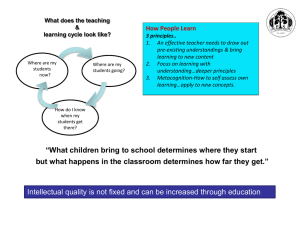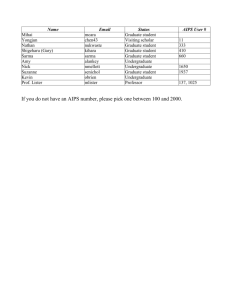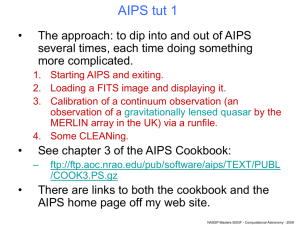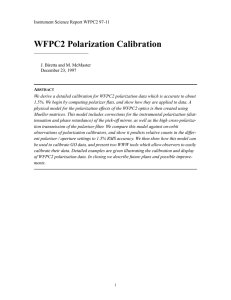Steering Committee Minutes 2-16-12
advertisement
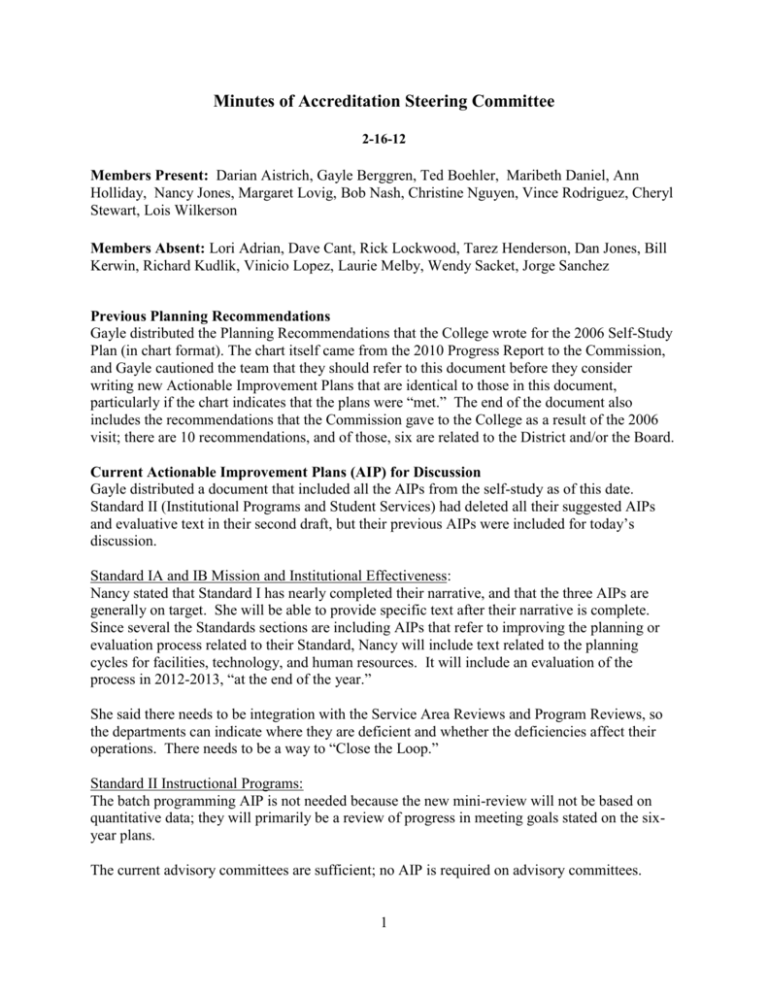
Minutes of Accreditation Steering Committee 2-16-12 Members Present: Darian Aistrich, Gayle Berggren, Ted Boehler, Maribeth Daniel, Ann Holliday, Nancy Jones, Margaret Lovig, Bob Nash, Christine Nguyen, Vince Rodriguez, Cheryl Stewart, Lois Wilkerson Members Absent: Lori Adrian, Dave Cant, Rick Lockwood, Tarez Henderson, Dan Jones, Bill Kerwin, Richard Kudlik, Vinicio Lopez, Laurie Melby, Wendy Sacket, Jorge Sanchez Previous Planning Recommendations Gayle distributed the Planning Recommendations that the College wrote for the 2006 Self-Study Plan (in chart format). The chart itself came from the 2010 Progress Report to the Commission, and Gayle cautioned the team that they should refer to this document before they consider writing new Actionable Improvement Plans that are identical to those in this document, particularly if the chart indicates that the plans were “met.” The end of the document also includes the recommendations that the Commission gave to the College as a result of the 2006 visit; there are 10 recommendations, and of those, six are related to the District and/or the Board. Current Actionable Improvement Plans (AIP) for Discussion Gayle distributed a document that included all the AIPs from the self-study as of this date. Standard II (Institutional Programs and Student Services) had deleted all their suggested AIPs and evaluative text in their second draft, but their previous AIPs were included for today’s discussion. Standard IA and IB Mission and Institutional Effectiveness: Nancy stated that Standard I has nearly completed their narrative, and that the three AIPs are generally on target. She will be able to provide specific text after their narrative is complete. Since several the Standards sections are including AIPs that refer to improving the planning or evaluation process related to their Standard, Nancy will include text related to the planning cycles for facilities, technology, and human resources. It will include an evaluation of the process in 2012-2013, “at the end of the year.” She said there needs to be integration with the Service Area Reviews and Program Reviews, so the departments can indicate where they are deficient and whether the deficiencies affect their operations. There needs to be a way to “Close the Loop.” Standard II Instructional Programs: The batch programming AIP is not needed because the new mini-review will not be based on quantitative data; they will primarily be a review of progress in meeting goals stated on the sixyear plans. The current advisory committees are sufficient; no AIP is required on advisory committees. 1 High quality instruction was discussed, and ways to ensure it. It was suggested that under Standard IIA2c that review of courses using the Academic Quality Rubric could be part of the program review process. Standard II Student Services: (Was not discussed) Standard II Library and Learning Support Services: Cheryl stated that the AIPs she had previously suggested will be integrated into the appropriate evaluation sections of her Standard and that most can be completed with the assistance of the new Webmaster. The recommendation we received in 2006 to provide equal library and learning resource services to military and incarcerated students was discussed, in light of the fact that the progress Cheryl had made in meeting the recommendation was then set back because of the budget crisis in the prisons, which put limitations of the educational officers and prison librarians. After discussion, it was suggested that the best path would be to work with the faculty to include assignments that can utilize “readers” or that can utilize the prison law libraries. Margaret Lovig could help with this. Cheryl will talk to Vince about the possibility of discussing this at the DL instructor meeting. Standard II China: (Was not discussed) Standard III Resources: A discussion about the faculty evaluations ensued, but it was still recommended to keep the AIP about the District to “undertake negotiations in 2012” since the college received a recommendation about the evaluation process. Nancy will include verbiage about a review of the planning process related to physical resource planning and using the results of the evaluation as the basis for improvement. Similarly, there is a need for a cycle of review for the technology plan; however it was noted that the technology plan needs to be reviewed on a more frequent basis than the suggested 6-year PIEAC cycle. A 3-year cycle was suggested. It was reported that we have been waiting for Anthony Maciel to write a computer replacement plan; we need this for the college and for the self-evaluation document. Christine said he has written one already for GWC, she has previously asked him to write one for CCC, and she will ask him again. Gayle said she will email him also. Ted said we need a specific computer and technology replacement plan. The team feels the AIP “Develop a plan for ISD to become profitable in the next two years” needs to be reworded. They also feel the evaluation section is misleading and needs to be rewritten. While they agree that telecourses are no longer as profitable, they still save the college thousands of dollars in licensing fees for our specialized programs (incarcerated and military). 2 Also, the development of Seaport is being “charged” to ISD, but its use as an online Course Management System (CMS) at CCC also saves the College thousands of dollars on CMS licensing fees (some estimates are a savings of ten million dollars) that we otherwise would have to spend. Additionally, at some point, Seaport will potentially become a product that can be marketable to other colleges. Standard IV Governance: The current AIPs were suggested by Dr. Serban, who would like the evaluations and AIPs to be the same for the three District colleges. The Standard IV committee members expressed frustration by this, however, because they feel that some of the evaluations do not reflect the actual experience and practice at CCC. They gave the example of the reorganization; the Board consistently rejects the College’s plans for our reorganization. For a year-and-a-half administrators and staff have carried burdensome, extra responsibilities while not being able to focus on many college issues that need to be addressed, for example, the Accreditation selfstudy. Many are working seven days a week. There is a lack of stability in our senior/executive management at a time when the president needs the assistance of strong leadership in key positions. It was decided that, since this is the College’s accreditation, not the District’s, that the College needs to be honest in its evaluation, and provide documentation and examples, where available. Date of Next Steering Committee Meeting March 1, 9-11 a.m., in the Fourth Floor Conference Room. Second (or third) drafts are also due that date. 3
